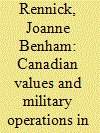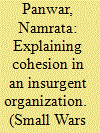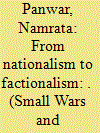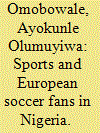| Srl | Item |
| 1 |
ID:
121818


|
|
|
|
|
| Publication |
2013.
|
| Summary/Abstract |
Whereas traditionally religion has played a central role in shaping the shared values in a society, secularization, privatization of religion, and pluralism are changing the values that personnel bring to the Canadian Forces. This late modern reality means that many people who have rejected traditional forms of religion in order to interpret their personal spiritual beliefs for themselves are uncertain about their core values. Differences in values among military personnel are further complicated by the realities of modern military engagements that require a greater need for ethical thinking and moral decision making. This article examines the nature of religion and values in late modern Canadian society and identifies religious leadership as a source of moral and ethical direction as well as consolation in the face of moral anomie. Finally, it highlights the need for greater education about the role of religion and values for military personnel.
|
|
|
|
|
|
|
|
|
|
|
|
|
|
|
|
| 2 |
ID:
158960


|
|
|
|
|
| Summary/Abstract |
Despite the prevalence of violent uprisings against the states, existing literature has produced a generalized explanation of the causes and onset of such uprisings ignoring crucial aspects of (non-state) armed group cohesion, such as their capabilities to manage intra-group tensions and rivalries. In this paper, I examine recent research in the field of civil conflict to understand the importance of investigating underlying constraints which can cause serious impediments to the capabilities of a state during the course of a war. The paper then focuses on the importance of internal strategic resources, such as pre-war and wartime sociopolitical networks in which insurgents mobilize, recruit new cadres and maintain intra-group cooperation, to suggest how it can contain the consequences of counterinsurgency operations and other state strategies on the internal cohesion of an insurgent group. A detailed case study of the Mizo National Front (MNF) in India demonstrates the argument’s plausibility.
|
|
|
|
|
|
|
|
|
|
|
|
|
|
|
|
| 3 |
ID:
152023


|
|
|
|
|
| Summary/Abstract |
Do ceasefires or peace talks create fragmentation in the insurgent groups? Rather than proposing claims that can offer predictions about armed groups behaviour under ceasefires or peace processes, the analysts tend to focus largely on the dynamics between state and non-state actor. The experts pay little attention to overtime changes in social and local political context which might contribute to propelling a rebel group towards fragmentation and factionalism. The present study intends to fill this gap by exploring the shifting role of public opinion and ethnic support for the peace talks to ascertain whether it can increase the likelihood of factionalism in rebel groups or not. This article applies this approach to the case of Naga National Movement (1947–2015) in India, and finds that the proposed variable appears to have increased the frequency of factionalism in the movement.
|
|
|
|
|
|
|
|
|
|
|
|
|
|
|
|
| 4 |
ID:
093692


|
|
|
|
|
| Publication |
2009.
|
| Summary/Abstract |
Sports seem to be an aspect of culture which cuts across all societies. Though it may be principally directed at entertainment and/or leisure, it is embedded with meanings in cultures where it is practised. Soccer, as a sporting event has transcended numerous cultures over the years. Prior to the 1990s in Nigeria, soccer fans were aligned with local clubs. With increasing globalization, fans are exposed more than ever before to the performances of foreign clubs and these have inevitably resulted in a redirection of fans' alignment with European clubs. Data for the study were collected through in-depth interviews with soccer fans in Nigeria.
|
|
|
|
|
|
|
|
|
|
|
|
|
|
|
|